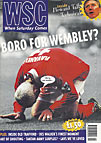 Tim Springett explains why Southampton supporters are uneasy about their club's recent stock market flotation
Tim Springett explains why Southampton supporters are uneasy about their club's recent stock market flotation
Feelings are running high on the south coast. The wanton destruction of Brighton, the chaos at Bournemouth and the sale of Portsmouth for £1 serve to compound a widely-held belief among supporters in the area that they are being taken for a ride by those who purport to have the best interests of their respective clubs at heart. By comparison Southampton looks like a sea of tranquillity. Don’t be fooled.
To understand why, one must consider the events of December 10th 1996. This was the day Southampton FC, after many years’ existence as the Premiership’s church mice, joined the super strata of footballing high-finance, linking up with Secure Retirement plc in a reverse take-over (which is when a private company, not listed on the Stock Market, takes over one that is so listed).
This, according to Chairman Guy Askham, was the quickest and most efficient way of getting a Stock Market listing, obviating the need for flotation expenses. The link-up with Secure Retirement, which would have been even more fitting in the days when Lawrie McMenemy turned the signing up of elderly players into an art form, has resulted in the creation of a parent company called Southampton Leisure Holdings.
The announcement of the flotation could not have been more timely, coming as it did two days before Saints’ plans for a new stadium on the outskirts of Southampton finally got the green light. Not all new ground developments are popular with fans but this is one for which Saints supporters have campaigned hard.
However £30 million is needed for the 30,000 capacity development and it is probable that a new share issue will be necessary to raise the cash. Meanwhile £4 million is said to have been made available for team strengthening, which by Saints standards is untold riches. Potentially it’s a great deal all round.
So why the unease? Partly because Southampton FC was valued at just £10.1 million in the deal; some supporters will have thought Matt Le Tissier was worth more than that by himself. However in the post-Bosman world it is not appropriate to attribute transfer values to players, quite apart from the fact that players’ values are highly subjective – a player is worth what another club is prepared to pay for him.
Secure, despite its plc status, was a tiny outfit, turning over a mere £1.8 million in the last financial year. This has enabled the Saints shareholders to take a 63% interest in the new company. But the low initial value was emphasised by the fact that share values in the new company quadrupled in value on their first morning of trading – turning five Saints directors into paper millionaires. Guy Askham paid £3,500 for his shares in the club – these are now worth £1.53 million!
This may not be the shock-horror story that it might appear. The idea of the flotation was to generate capital so of course the share values should increase. The question of who owns the shares, and thereby controls the club, is much more significant and , in this regard, it is surely better for the holder of the largest shareholding to be someone who has served on the board for quarter of a century than a total stranger with no interest in the football club.
Guy Askham has undertaken to retain his shares (although for how long is unclear) and even though he now holds the part-time position of Deputy Chairman of Southampton Leisure Holdings, his annual salary in the post of £30,000 is positively altruistic by company director standards. By contrast Secure had a number of small shareholders, none of whom could wield any influence individually.
However the possibility exists that existing holders of the controlling interest might be tempted to cash in and allow profit-maximisers to gain control of the football club. One major Saints shareholder is a retired Wiltshire farmer who inherited his shares from his grandfather and has little interest in football. He now owns an 18% holding in Southampton Leisure Holdings worth £7.5 million. If just he were to sell it could seriously upset the balance of power.
Members of the Southampton Independent Supporters Association are sufficiently concerned to have purchased some of the new shares and sought assurances about the club’s future. But in response those in positions of power have suddenly become so defensive that they may yet figure in Graeme Souness’ plans for stemming the flow of goals the team is conceding.
All of which begs the question; if they have nothing to hide, why the reticence about their actions? The concerns of supporters should be allayed and as long as the club refuses to do so, the smell of a rat becomes increasingly strong.
From WSC 122 April 1997. What was happening this month